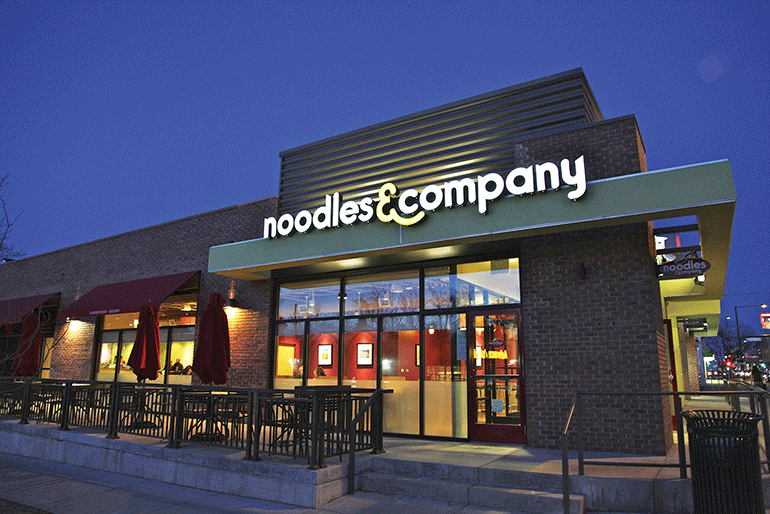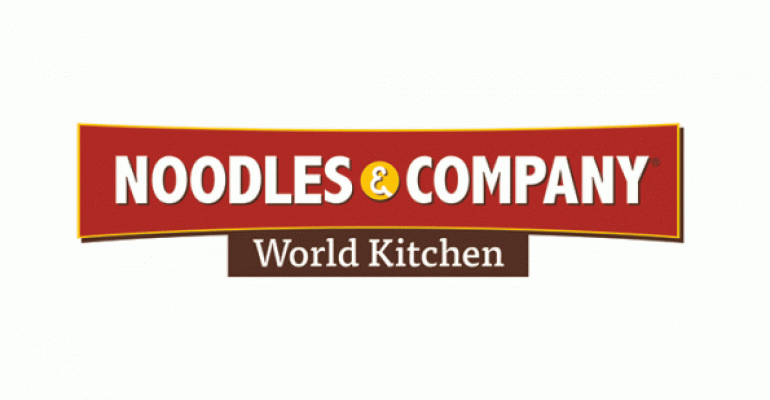Noodles & Company is considering closing some underperforming restaurants as it looks for ways to strengthen its financial position amid continued weak sales.
The Denver-based fast-casual operator, which is slowing new unit growth and looking for a new CEO, said Thursday that the bottom 10 percent of its restaurants had negative cash flow of $2.6 million in the third quarter ended Sept. 27.
Noodles & Company has 455 company-owned locations, with 10 percent of that figure encompassing around 45 units. Franchisees own another 73 locations.
“We recognize that many of the restaurants that are underperforming have a substantial hurdle to overcome, will require a significant amount or resources to turn around,” Dave Boennighausen, Noodles & Company CFO and interim CEO said during an earnings call Thursday. “We are currently looking at several options for these underperforming restaurants, including possible closures.”
The company is also looking to refranchise certain markets to local operators “who may be better equipped to develop these respective markets.”
Doing so “would allow us to focus our resources on our large base of successful restaurants that have greater earnings potential,” Boennighausen said.

Noodles & Company still plans to open 10 to 15 locations in “low-risk markets with strong brand awareness and proven success.”
The company is looking at “various alternatives to financially support” potential restaurant closures or refranchising efforts, Boennighausen said. The company is “a little bit early in the decision process,” so it is uncertain when Noodles & Company might close or refranchise locations.
“We’re evaluating the entire portfolio,” he said, noting that the company is looking at cash flow, occupancy costs and the trade area for each location.
While Noodles & Company expects stronger cash flow, the company is working to cut general and administrative expenses to save $2.5 million a year. The company also hinted that it is making changes in its loan agreements to loosen financial requirements associated with that deal.
The potential for closures comes amid stubbornly weak same-store sales that have cost the company much of its stock price value. Shortly after its 2013 initial public offering, Noodles & Company stock skyrocketed past $50 a share. On Friday, its stock price fell another 5 percent, and is down more than 50 percent in 2016.
Total revenue increased 4.6 percent in the third quarter, to $122.7 million, from $117.3 million the previous year. But Noodles & Company recorded a $9.8 million net loss (35 cents per share) in the quarter. So far this year, the company has lost $26.3 million, or 95 cents per share. A year ago this time, it had lost $9.5 million in the same period, or 32 cents per share.
Adjusted earnings before interest, taxes, depreciation and amortization, or EBITDA, declined 29 percent, to $6.2 million, from $8.7 million the previous year.
Same-store sales fell 0.7 percent systemwide, including a decline of 0.9 percent at company locations and a 0.6-percent increase at franchised units.
Boennighausen said Noodles & Company has seen “modest sequential improvement” early in the fourth quarter, including a 2.4-percent same-store sales increase at franchised locations. But he added that the company “will likely continue to see volatility in the comparable sales figure.”
To reverse declining same-store sales, the company has made efforts to streamline its menu. Among them: Getting rid of sandwiches.
“This category never quite resonated with our guests, ultimately representing only a few percentage points of menu mix,” Boennighausen said.
The company has tested the removal of sandwiches in certain markets. “We thus far have seen negligible resistance to date,” he said, noting that the move will also help improve transaction times.
“We believe the overall operations have gotten too complex,” Boennighausen said. “Our intent is to make it easier to execute the core concept.”
Noodles & Company is concentrating menu innovation on pasta, where its offerings are more unique. The chain launched a Grown Up Mac & Cheese menu in October, including Buffalo Mac, Bacon Mac & Cheeseburger and BBQ Pork Mac varieties. The company is testing a variety of other items, including oven-roasted tomatoes in many of its Mediterranean dishes.
The company implemented “smaller personnel and operational changes,” changing food preparation and operations procedures and introducing incentives to retain employees. The changes were designed to improve employee and customer experiences.
“We believe firmly that in order to improve our revenue and earnings, we need to improve our core menu, as well as improve both operational consistency and efficiency,” Boennighausen said.
The company is also slowing its investments in naturally raised steak and chicken offerings. “We have had difficulty securing supply at an acceptable price,” Boennighausen said. “We feel it will be important to balance our long-term goal of offering all naturally raised proteins with the current supply constraints in the industry.”
Contact Jonathan Maze at [email protected]
Follow him on Twitter: @jonathanamaze





